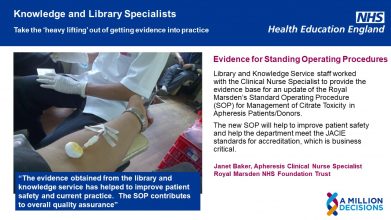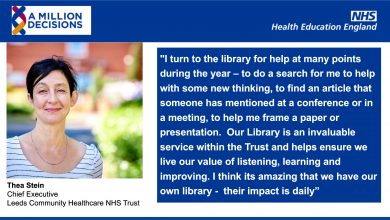Key aspects of the role
- Developing and leading on implementation of the Knowledge & Library Service vision and key strategic objectives aligned to local healthcare organisations and the Knowledge for Healthcare Strategy.
- Engaging with senior leaders outlining the multiple benefits from utilising the expertise of specialist librarians and knowledge specialists.
- Managing resources for the local service including development and support of the library team and responsibility for the overall budget.
- Developing and promoting services which are responsive to the needs of the organisation.
- Monitoring effectiveness of the service, demonstrating impact and assuring the quality of services provided.
- Leading on professional library-related issues such as provision of a synthesised evidence search service or development of knowledge mobilisation activities.

Skills and knowledge
You may require a high level of knowledge and skills in the following CILIP Professional Knowledge and Skills Base (PKSB) sections to work within this role:
Ethics and Values. Underpinning healthcare ethics and values by providing the best available evidence at the right time, in the right place, to inform decision-making and enable better outcomes for patients and populations.
Professional development. Reflecting on practice and being self-aware about performance.
Organisational and environmental context. Understanding organisational priorities and challenges identified by the executive team.
Wider library, data, information and knowledge sector context. Networking across the healthcare economy, both information providers, data analysts and health informaticists, to support shared learning and joint working.
Collection management and development. Ensuring that collections are accessible and meet the diverse needs of the user community, for example digital access and supporting care at the point of need.
Data Management. Identifying and harnessing data’s value in strategic planning and business decisions, using an evidence-based approach to health knowledge service development and policy.
Information exploitation and use. Delivery of information through routes such as alerts, current awareness, enquiries and literature searches, including saving the time of users by providing time-saving services such as synthesis and summaries of evidence.
Information governance and compliance. Tracking and safeguarding of personal information including information audits of the service and the use of information asset registers.
Information management. Advising the organisation on the opportunity to improve information management.
Knowledge management. Embedding KM into ways of working – for example facilitating a Before Action Review before an organisational project commences and an After Action Review at its conclusion.
Literacies and learning. Initiating and contributing to work intended to improve the information, data, digital and health literacy of staff and learners.
Records management and archiving. Appreciation of record management issues arising within the NHS including sensitive data, appropriate disposal of records and systems for ensuring the secure access and use of records.
Research. Disseminating research evidence to inform service and quality improvement and innovation.
Customer focus. Service design and marketing. Engaging with a variety of users across the healthcare landscape to provide a professional and efficient service.
Leadership, advocacy, influencing and personal effectiveness. Showing strong leadership skills in order to ensure the visibility and breadth of involvement of the service across the organisation.
Strategy, planning and management. Considering the context of the organisation served and delivering services to benefit the organisation, users or a specific community of users.
Technology and communication. Networking and advocacy within and outside the local organisation to share good practice, maintain professional awareness, and promote services.
Further information about the CILIP Professional Knowledge and Skills Base
60 seconds with…Helen Swales, Library Services Manager

I am Helen Swales, and I am the Library Services Manager at Leeds Community Healthcare NHS Trust. We provide services, via Service Level Agreements, to the Leeds CCG (including primary care) and also public health staff in the Council, as well as Leeds Community Healthcare. We also provide a service to the two adult hospices in Leeds.
In a sentence what does your job entail? My job is to manage our proactive service that provides literature searching, current awareness, document supply and information skills training to all those users.
Tell us about your proudest achievement at work? In December 2020, I was awarded the Director of Health Libraries Annual Prize for Yorkshire and Humber. I was surprised and delighted to receive this award, although it did make me wonder if I should start to think about retiring!
Are there things that you do in your job that would surprise others? I have been working in this role since 1998 and have TUPE’d my way through various organisational changes over the last two decades. Despite all the name badge changes, we’ve fundamentally been serving the same users throughout this time.
My Library and Information Service has always been part of the Informatics directorate, rather than any other division (such as Human Resources, Education, or Medical Directorate). This has meant that I am part of a service which is viewed as having an organisation wide remit, and this has helped the library service to be embedded in all the organisations we have been a part of. This “home” has certainly stood us in good stead through the years.
What is your top career tip? Be curious about the things which are happening around you and be open to change. Do read all Trust news and bulletins with a view of “how can we, as a service, get involved in this project or this initiative”.
How do you see your role changing over the next couple of years? The organisations we serve will develop, the commissioners will change, and the needs of our users will alter, but there will always be people that need our service. It is important that I ensure that the service, and my skills and those of my team, are up to date and relevant to continue to meet the needs of our customers.
Building relationships with staff that you interact with will always be key to help proving your worth and the value of the service. Although the library is in the trust headquarters, the bulk of our users have always been offsite (at community health centres, GP practices etc). The arrival of MS Teams gives us a great opportunity to “meet” with our users, without having to drive anywhere. During the pandemic, I’ve “seen” so many of our users via MS Teams that I’d only previously ever dealt with by email.
What is the most challenging thing you have dealt with at work? This is not a unique answer, but like many people it has been challenging to lead a small team through the pandemic and home school two primary school children at the same time.
Have you got any hidden talents? I am a pianist, and used to play for the Leeds University Dance Band, as well as lots of rehearsals and shows for various groups. I don’t have any time for that at the moment with having school aged children, but I look forward to returning to this at some point.
What do you enjoy most about your role? Although I’ve been in this role for a long time, the job is always changing. I’ve got a huge amount of autonomy in what I do and have basically being left alone for 23 years, which is really rather nice!
Receiving positive feedback, like the comments from our Chief Executive below, make the hard work all worthwhile.
